Final Analysis: Social Work Case Study on Migration Unemployment
VerifiedAdded on 2023/01/20
|5
|1703
|26
Case Study
AI Summary
This case study delves into the pressing issue of migrant unemployment in Australia, highlighting the challenges faced by migrants in securing employment despite their qualifications and skills. The analysis emphasizes the importance of social justice, equality, and equity in addressing this issue. It explores themes of discrimination, oppression, and the violation of human rights, advocating for anti-oppression practices and effective policies to protect migrants' rights. The study examines the role of social workers, government initiatives, and community engagement in promoting equal opportunities and fostering a supportive environment for migrants. It discusses the need for ethical values, human rights enforcement, and the recognition of migrants' independence and needs. The analysis also touches upon the categorization of human rights and the importance of protecting socio-economic rights. The case study concludes with recommendations for social work practices at different levels of society to eliminate discrimination and promote integration.
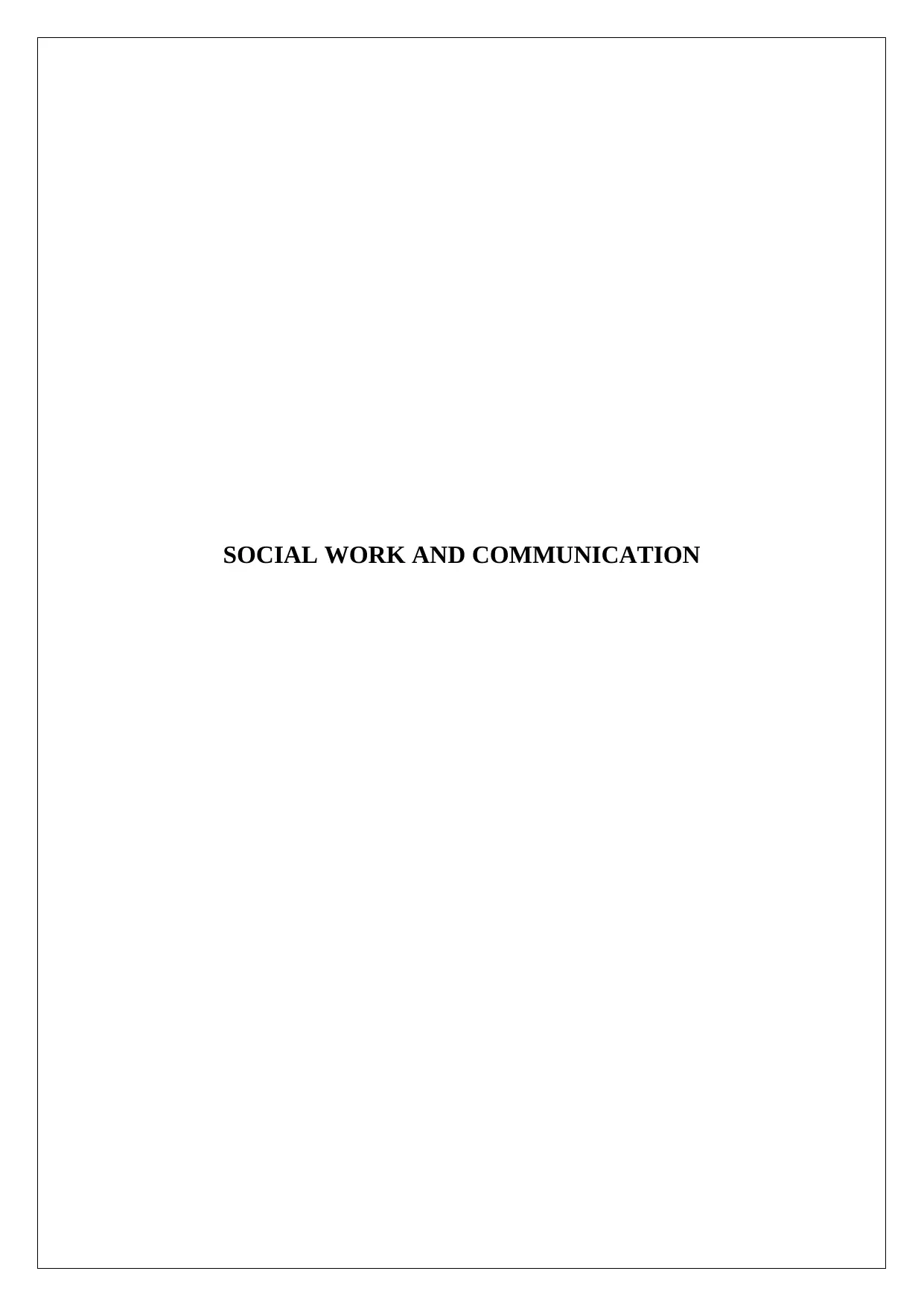
SOCIAL WORK AND COMMUNICATION
Paraphrase This Document
Need a fresh take? Get an instant paraphrase of this document with our AI Paraphraser
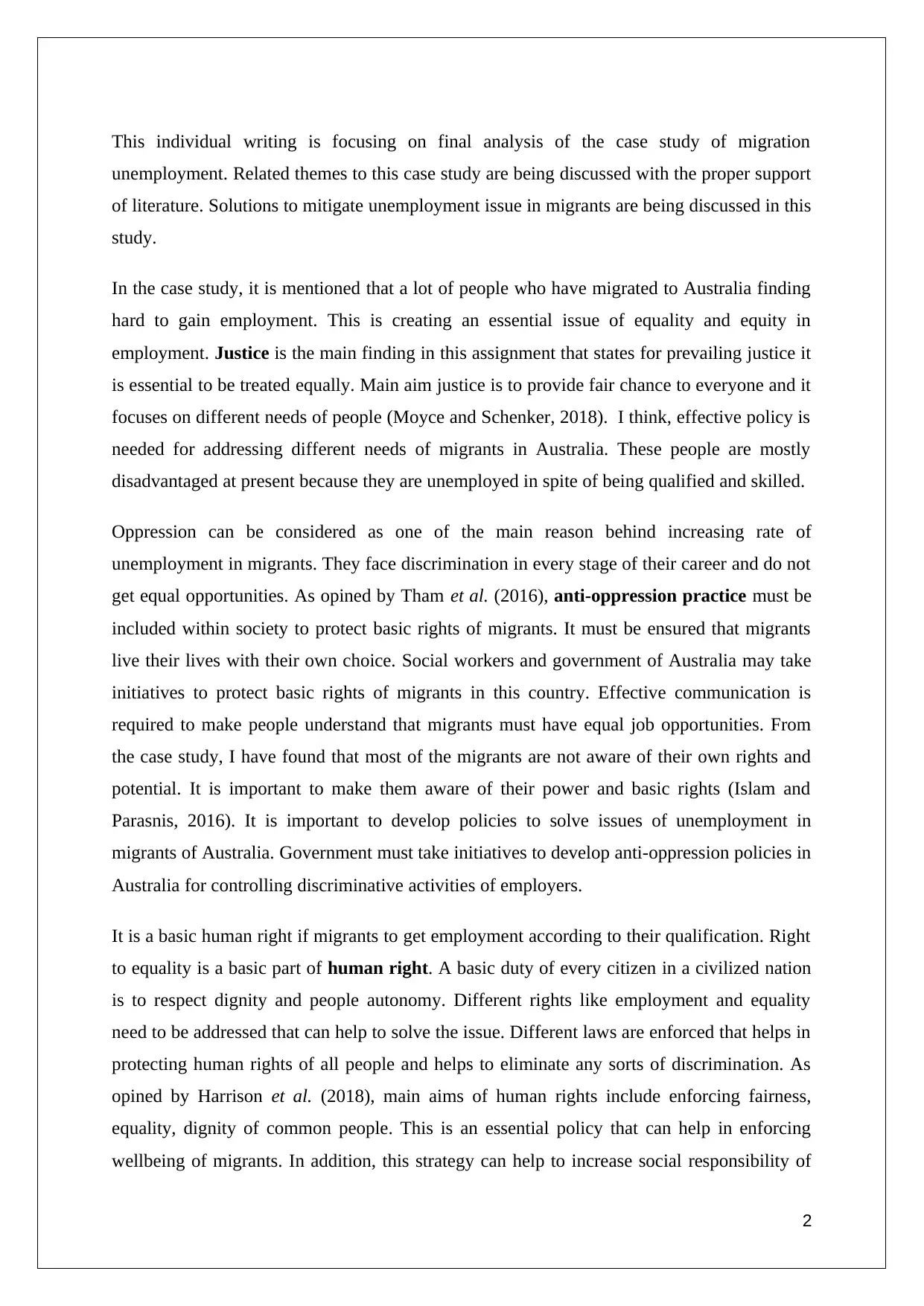
This individual writing is focusing on final analysis of the case study of migration
unemployment. Related themes to this case study are being discussed with the proper support
of literature. Solutions to mitigate unemployment issue in migrants are being discussed in this
study.
In the case study, it is mentioned that a lot of people who have migrated to Australia finding
hard to gain employment. This is creating an essential issue of equality and equity in
employment. Justice is the main finding in this assignment that states for prevailing justice it
is essential to be treated equally. Main aim justice is to provide fair chance to everyone and it
focuses on different needs of people (Moyce and Schenker, 2018). I think, effective policy is
needed for addressing different needs of migrants in Australia. These people are mostly
disadvantaged at present because they are unemployed in spite of being qualified and skilled.
Oppression can be considered as one of the main reason behind increasing rate of
unemployment in migrants. They face discrimination in every stage of their career and do not
get equal opportunities. As opined by Tham et al. (2016), anti-oppression practice must be
included within society to protect basic rights of migrants. It must be ensured that migrants
live their lives with their own choice. Social workers and government of Australia may take
initiatives to protect basic rights of migrants in this country. Effective communication is
required to make people understand that migrants must have equal job opportunities. From
the case study, I have found that most of the migrants are not aware of their own rights and
potential. It is important to make them aware of their power and basic rights (Islam and
Parasnis, 2016). It is important to develop policies to solve issues of unemployment in
migrants of Australia. Government must take initiatives to develop anti-oppression policies in
Australia for controlling discriminative activities of employers.
It is a basic human right if migrants to get employment according to their qualification. Right
to equality is a basic part of human right. A basic duty of every citizen in a civilized nation
is to respect dignity and people autonomy. Different rights like employment and equality
need to be addressed that can help to solve the issue. Different laws are enforced that helps in
protecting human rights of all people and helps to eliminate any sorts of discrimination. As
opined by Harrison et al. (2018), main aims of human rights include enforcing fairness,
equality, dignity of common people. This is an essential policy that can help in enforcing
wellbeing of migrants. In addition, this strategy can help to increase social responsibility of
2
unemployment. Related themes to this case study are being discussed with the proper support
of literature. Solutions to mitigate unemployment issue in migrants are being discussed in this
study.
In the case study, it is mentioned that a lot of people who have migrated to Australia finding
hard to gain employment. This is creating an essential issue of equality and equity in
employment. Justice is the main finding in this assignment that states for prevailing justice it
is essential to be treated equally. Main aim justice is to provide fair chance to everyone and it
focuses on different needs of people (Moyce and Schenker, 2018). I think, effective policy is
needed for addressing different needs of migrants in Australia. These people are mostly
disadvantaged at present because they are unemployed in spite of being qualified and skilled.
Oppression can be considered as one of the main reason behind increasing rate of
unemployment in migrants. They face discrimination in every stage of their career and do not
get equal opportunities. As opined by Tham et al. (2016), anti-oppression practice must be
included within society to protect basic rights of migrants. It must be ensured that migrants
live their lives with their own choice. Social workers and government of Australia may take
initiatives to protect basic rights of migrants in this country. Effective communication is
required to make people understand that migrants must have equal job opportunities. From
the case study, I have found that most of the migrants are not aware of their own rights and
potential. It is important to make them aware of their power and basic rights (Islam and
Parasnis, 2016). It is important to develop policies to solve issues of unemployment in
migrants of Australia. Government must take initiatives to develop anti-oppression policies in
Australia for controlling discriminative activities of employers.
It is a basic human right if migrants to get employment according to their qualification. Right
to equality is a basic part of human right. A basic duty of every citizen in a civilized nation
is to respect dignity and people autonomy. Different rights like employment and equality
need to be addressed that can help to solve the issue. Different laws are enforced that helps in
protecting human rights of all people and helps to eliminate any sorts of discrimination. As
opined by Harrison et al. (2018), main aims of human rights include enforcing fairness,
equality, dignity of common people. This is an essential policy that can help in enforcing
wellbeing of migrants. In addition, this strategy can help to increase social responsibility of
2
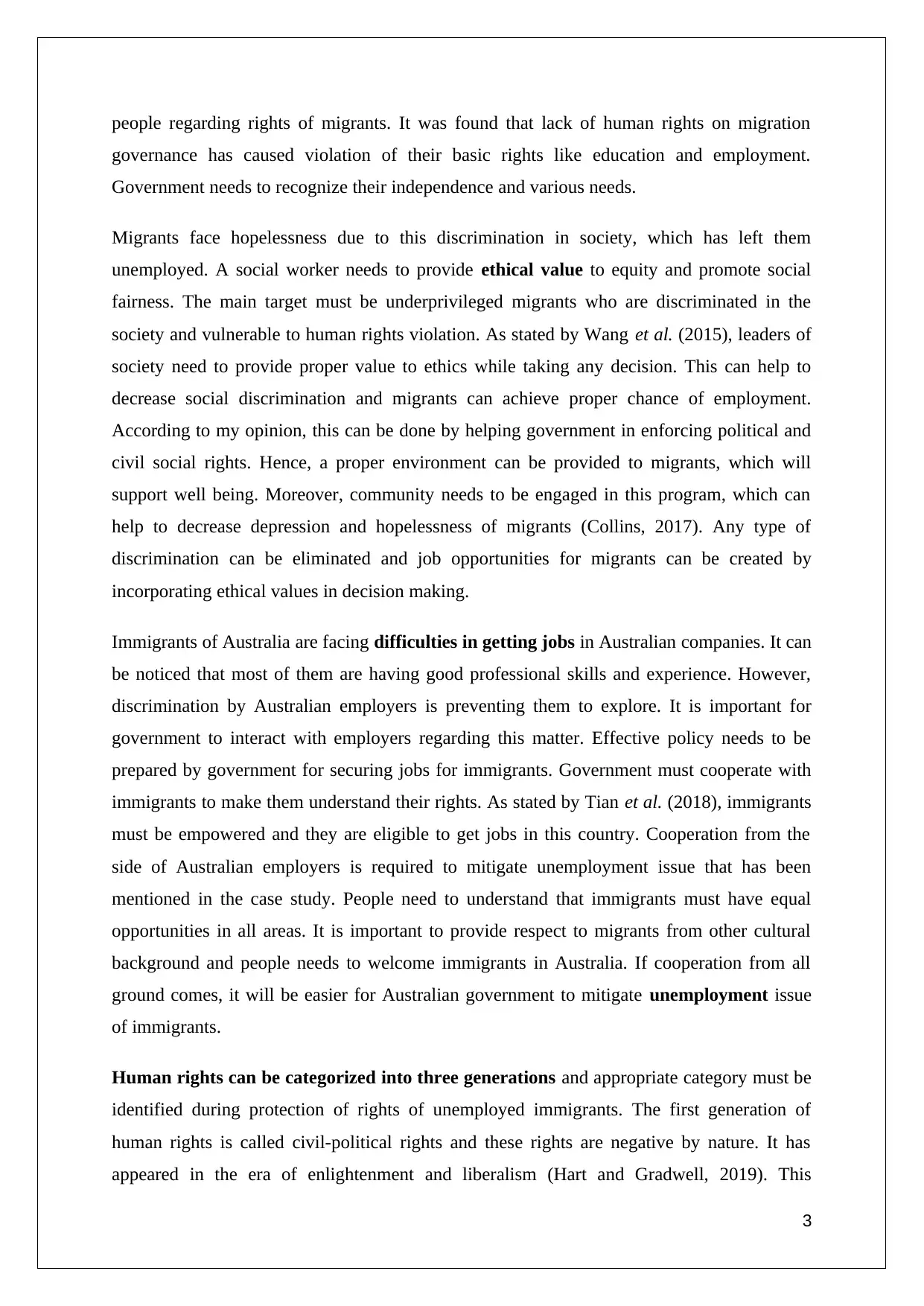
people regarding rights of migrants. It was found that lack of human rights on migration
governance has caused violation of their basic rights like education and employment.
Government needs to recognize their independence and various needs.
Migrants face hopelessness due to this discrimination in society, which has left them
unemployed. A social worker needs to provide ethical value to equity and promote social
fairness. The main target must be underprivileged migrants who are discriminated in the
society and vulnerable to human rights violation. As stated by Wang et al. (2015), leaders of
society need to provide proper value to ethics while taking any decision. This can help to
decrease social discrimination and migrants can achieve proper chance of employment.
According to my opinion, this can be done by helping government in enforcing political and
civil social rights. Hence, a proper environment can be provided to migrants, which will
support well being. Moreover, community needs to be engaged in this program, which can
help to decrease depression and hopelessness of migrants (Collins, 2017). Any type of
discrimination can be eliminated and job opportunities for migrants can be created by
incorporating ethical values in decision making.
Immigrants of Australia are facing difficulties in getting jobs in Australian companies. It can
be noticed that most of them are having good professional skills and experience. However,
discrimination by Australian employers is preventing them to explore. It is important for
government to interact with employers regarding this matter. Effective policy needs to be
prepared by government for securing jobs for immigrants. Government must cooperate with
immigrants to make them understand their rights. As stated by Tian et al. (2018), immigrants
must be empowered and they are eligible to get jobs in this country. Cooperation from the
side of Australian employers is required to mitigate unemployment issue that has been
mentioned in the case study. People need to understand that immigrants must have equal
opportunities in all areas. It is important to provide respect to migrants from other cultural
background and people needs to welcome immigrants in Australia. If cooperation from all
ground comes, it will be easier for Australian government to mitigate unemployment issue
of immigrants.
Human rights can be categorized into three generations and appropriate category must be
identified during protection of rights of unemployed immigrants. The first generation of
human rights is called civil-political rights and these rights are negative by nature. It has
appeared in the era of enlightenment and liberalism (Hart and Gradwell, 2019). This
3
governance has caused violation of their basic rights like education and employment.
Government needs to recognize their independence and various needs.
Migrants face hopelessness due to this discrimination in society, which has left them
unemployed. A social worker needs to provide ethical value to equity and promote social
fairness. The main target must be underprivileged migrants who are discriminated in the
society and vulnerable to human rights violation. As stated by Wang et al. (2015), leaders of
society need to provide proper value to ethics while taking any decision. This can help to
decrease social discrimination and migrants can achieve proper chance of employment.
According to my opinion, this can be done by helping government in enforcing political and
civil social rights. Hence, a proper environment can be provided to migrants, which will
support well being. Moreover, community needs to be engaged in this program, which can
help to decrease depression and hopelessness of migrants (Collins, 2017). Any type of
discrimination can be eliminated and job opportunities for migrants can be created by
incorporating ethical values in decision making.
Immigrants of Australia are facing difficulties in getting jobs in Australian companies. It can
be noticed that most of them are having good professional skills and experience. However,
discrimination by Australian employers is preventing them to explore. It is important for
government to interact with employers regarding this matter. Effective policy needs to be
prepared by government for securing jobs for immigrants. Government must cooperate with
immigrants to make them understand their rights. As stated by Tian et al. (2018), immigrants
must be empowered and they are eligible to get jobs in this country. Cooperation from the
side of Australian employers is required to mitigate unemployment issue that has been
mentioned in the case study. People need to understand that immigrants must have equal
opportunities in all areas. It is important to provide respect to migrants from other cultural
background and people needs to welcome immigrants in Australia. If cooperation from all
ground comes, it will be easier for Australian government to mitigate unemployment issue
of immigrants.
Human rights can be categorized into three generations and appropriate category must be
identified during protection of rights of unemployed immigrants. The first generation of
human rights is called civil-political rights and these rights are negative by nature. It has
appeared in the era of enlightenment and liberalism (Hart and Gradwell, 2019). This
3
⊘ This is a preview!⊘
Do you want full access?
Subscribe today to unlock all pages.

Trusted by 1+ million students worldwide
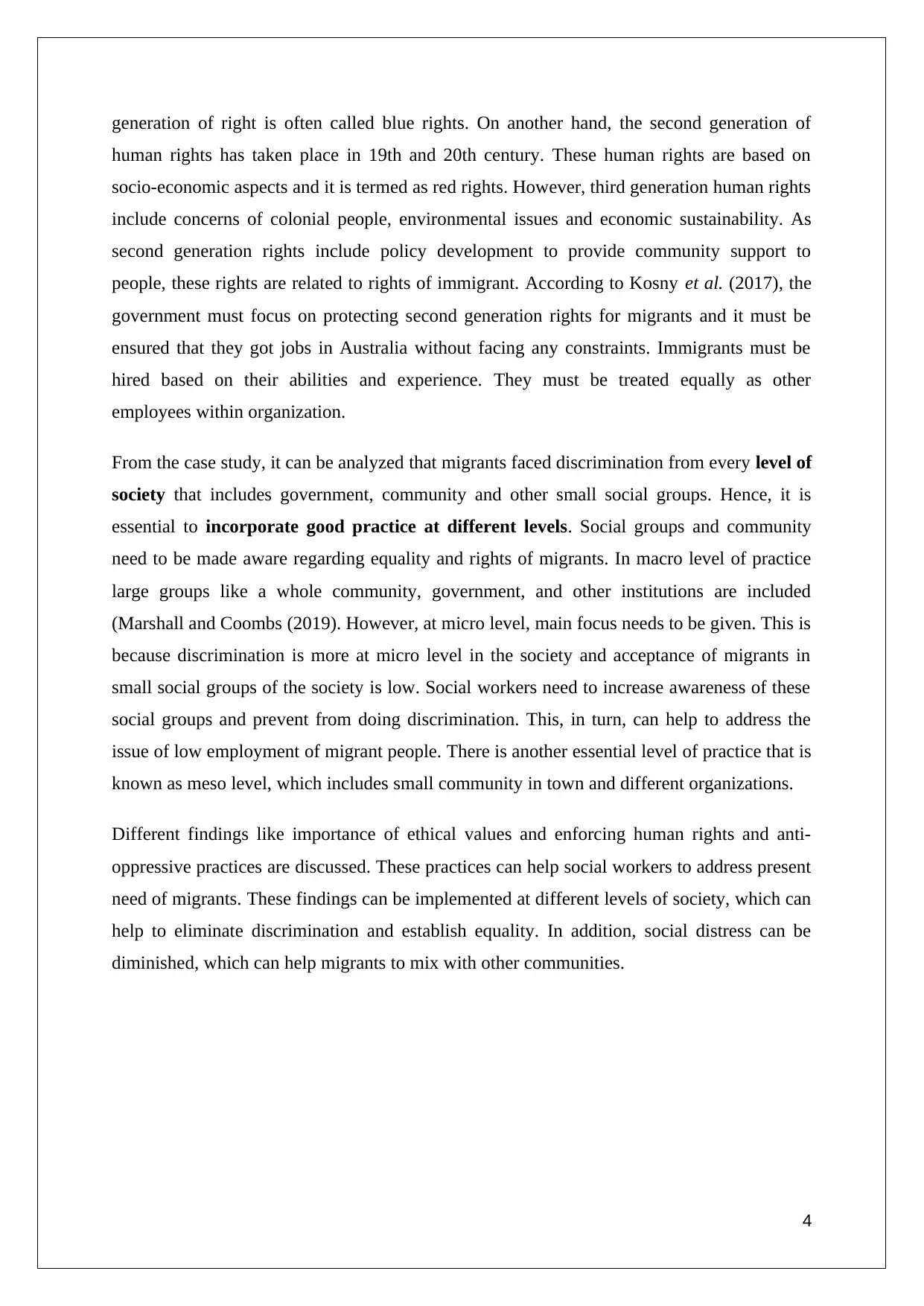
generation of right is often called blue rights. On another hand, the second generation of
human rights has taken place in 19th and 20th century. These human rights are based on
socio-economic aspects and it is termed as red rights. However, third generation human rights
include concerns of colonial people, environmental issues and economic sustainability. As
second generation rights include policy development to provide community support to
people, these rights are related to rights of immigrant. According to Kosny et al. (2017), the
government must focus on protecting second generation rights for migrants and it must be
ensured that they got jobs in Australia without facing any constraints. Immigrants must be
hired based on their abilities and experience. They must be treated equally as other
employees within organization.
From the case study, it can be analyzed that migrants faced discrimination from every level of
society that includes government, community and other small social groups. Hence, it is
essential to incorporate good practice at different levels. Social groups and community
need to be made aware regarding equality and rights of migrants. In macro level of practice
large groups like a whole community, government, and other institutions are included
(Marshall and Coombs (2019). However, at micro level, main focus needs to be given. This is
because discrimination is more at micro level in the society and acceptance of migrants in
small social groups of the society is low. Social workers need to increase awareness of these
social groups and prevent from doing discrimination. This, in turn, can help to address the
issue of low employment of migrant people. There is another essential level of practice that is
known as meso level, which includes small community in town and different organizations.
Different findings like importance of ethical values and enforcing human rights and anti-
oppressive practices are discussed. These practices can help social workers to address present
need of migrants. These findings can be implemented at different levels of society, which can
help to eliminate discrimination and establish equality. In addition, social distress can be
diminished, which can help migrants to mix with other communities.
4
human rights has taken place in 19th and 20th century. These human rights are based on
socio-economic aspects and it is termed as red rights. However, third generation human rights
include concerns of colonial people, environmental issues and economic sustainability. As
second generation rights include policy development to provide community support to
people, these rights are related to rights of immigrant. According to Kosny et al. (2017), the
government must focus on protecting second generation rights for migrants and it must be
ensured that they got jobs in Australia without facing any constraints. Immigrants must be
hired based on their abilities and experience. They must be treated equally as other
employees within organization.
From the case study, it can be analyzed that migrants faced discrimination from every level of
society that includes government, community and other small social groups. Hence, it is
essential to incorporate good practice at different levels. Social groups and community
need to be made aware regarding equality and rights of migrants. In macro level of practice
large groups like a whole community, government, and other institutions are included
(Marshall and Coombs (2019). However, at micro level, main focus needs to be given. This is
because discrimination is more at micro level in the society and acceptance of migrants in
small social groups of the society is low. Social workers need to increase awareness of these
social groups and prevent from doing discrimination. This, in turn, can help to address the
issue of low employment of migrant people. There is another essential level of practice that is
known as meso level, which includes small community in town and different organizations.
Different findings like importance of ethical values and enforcing human rights and anti-
oppressive practices are discussed. These practices can help social workers to address present
need of migrants. These findings can be implemented at different levels of society, which can
help to eliminate discrimination and establish equality. In addition, social distress can be
diminished, which can help migrants to mix with other communities.
4
Paraphrase This Document
Need a fresh take? Get an instant paraphrase of this document with our AI Paraphraser
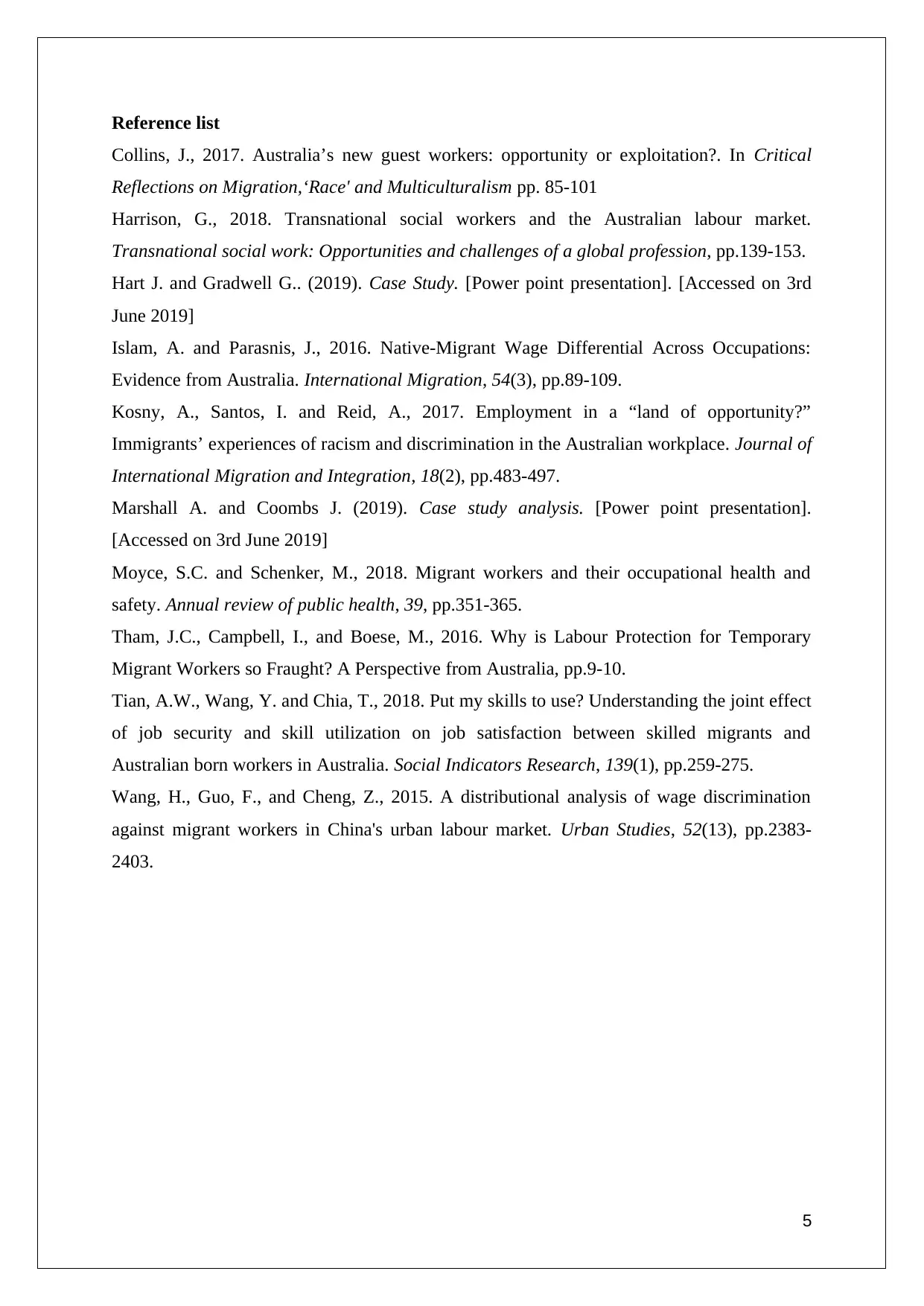
Reference list
Collins, J., 2017. Australia’s new guest workers: opportunity or exploitation?. In Critical
Reflections on Migration,‘Race' and Multiculturalism pp. 85-101
Harrison, G., 2018. Transnational social workers and the Australian labour market.
Transnational social work: Opportunities and challenges of a global profession, pp.139-153.
Hart J. and Gradwell G.. (2019). Case Study. [Power point presentation]. [Accessed on 3rd
June 2019]
Islam, A. and Parasnis, J., 2016. Native‐Migrant Wage Differential Across Occupations:
Evidence from Australia. International Migration, 54(3), pp.89-109.
Kosny, A., Santos, I. and Reid, A., 2017. Employment in a “land of opportunity?”
Immigrants’ experiences of racism and discrimination in the Australian workplace. Journal of
International Migration and Integration, 18(2), pp.483-497.
Marshall A. and Coombs J. (2019). Case study analysis. [Power point presentation].
[Accessed on 3rd June 2019]
Moyce, S.C. and Schenker, M., 2018. Migrant workers and their occupational health and
safety. Annual review of public health, 39, pp.351-365.
Tham, J.C., Campbell, I., and Boese, M., 2016. Why is Labour Protection for Temporary
Migrant Workers so Fraught? A Perspective from Australia, pp.9-10.
Tian, A.W., Wang, Y. and Chia, T., 2018. Put my skills to use? Understanding the joint effect
of job security and skill utilization on job satisfaction between skilled migrants and
Australian born workers in Australia. Social Indicators Research, 139(1), pp.259-275.
Wang, H., Guo, F., and Cheng, Z., 2015. A distributional analysis of wage discrimination
against migrant workers in China's urban labour market. Urban Studies, 52(13), pp.2383-
2403.
5
Collins, J., 2017. Australia’s new guest workers: opportunity or exploitation?. In Critical
Reflections on Migration,‘Race' and Multiculturalism pp. 85-101
Harrison, G., 2018. Transnational social workers and the Australian labour market.
Transnational social work: Opportunities and challenges of a global profession, pp.139-153.
Hart J. and Gradwell G.. (2019). Case Study. [Power point presentation]. [Accessed on 3rd
June 2019]
Islam, A. and Parasnis, J., 2016. Native‐Migrant Wage Differential Across Occupations:
Evidence from Australia. International Migration, 54(3), pp.89-109.
Kosny, A., Santos, I. and Reid, A., 2017. Employment in a “land of opportunity?”
Immigrants’ experiences of racism and discrimination in the Australian workplace. Journal of
International Migration and Integration, 18(2), pp.483-497.
Marshall A. and Coombs J. (2019). Case study analysis. [Power point presentation].
[Accessed on 3rd June 2019]
Moyce, S.C. and Schenker, M., 2018. Migrant workers and their occupational health and
safety. Annual review of public health, 39, pp.351-365.
Tham, J.C., Campbell, I., and Boese, M., 2016. Why is Labour Protection for Temporary
Migrant Workers so Fraught? A Perspective from Australia, pp.9-10.
Tian, A.W., Wang, Y. and Chia, T., 2018. Put my skills to use? Understanding the joint effect
of job security and skill utilization on job satisfaction between skilled migrants and
Australian born workers in Australia. Social Indicators Research, 139(1), pp.259-275.
Wang, H., Guo, F., and Cheng, Z., 2015. A distributional analysis of wage discrimination
against migrant workers in China's urban labour market. Urban Studies, 52(13), pp.2383-
2403.
5
1 out of 5
Related Documents
Your All-in-One AI-Powered Toolkit for Academic Success.
+13062052269
info@desklib.com
Available 24*7 on WhatsApp / Email
![[object Object]](/_next/static/media/star-bottom.7253800d.svg)
Unlock your academic potential
Copyright © 2020–2026 A2Z Services. All Rights Reserved. Developed and managed by ZUCOL.





